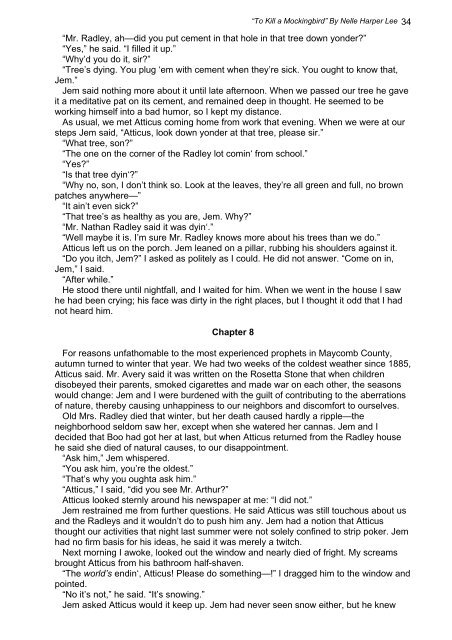Create successful ePaper yourself
Turn your PDF publications into a flip-book with our unique Google optimized e-Paper software.
“To Kill a Mockingbird” By Nelle Harper Lee 34<br />
“Mr. Radley, ah—did you put cement in that hole in that tree down yonder?”<br />
“Yes,” he said. “I filled it up.”<br />
“Why’d you do it, sir?”<br />
“Tree’s dying. You plug ‘em with cement when they’re sick. You ought to know that,<br />
Jem.”<br />
Jem said nothing more about it until late afternoon. When we passed our tree he gave<br />
it a meditative pat on its cement, and remained deep in thought. He seemed to be<br />
working himself into a bad humor, so I kept my distance.<br />
As usual, we met Atticus coming home from work that evening. When we were at our<br />
steps Jem said, “Atticus, look down yonder at that tree, please sir.”<br />
“What tree, son?”<br />
“The one on the corner of the Radley lot comin‘ from school.”<br />
“Yes?”<br />
“Is that tree dyin‘?”<br />
“Why no, son, I don’t think so. Look at the leaves, they’re all green and full, no brown<br />
patches anywhere—”<br />
“It ain’t even sick?”<br />
“That tree’s as healthy as you are, Jem. Why?”<br />
“Mr. Nathan Radley said it was dyin‘.”<br />
“Well maybe it is. I’m sure Mr. Radley knows more about his trees than we do.”<br />
Atticus left us on the porch. Jem leaned on a pillar, rubbing his shoulders against it.<br />
“Do you itch, Jem?” I asked as politely as I could. He did not answer. “Come on in,<br />
Jem,” I said.<br />
“After while.”<br />
He stood there until nightfall, and I waited for him. When we went in the house I saw<br />
he had been crying; his face was dirty in the right places, but I thought it odd that I had<br />
not heard him.<br />
Chapter 8<br />
For reasons unfathomable to the most experienced prophets in Maycomb County,<br />
autumn turned to winter that year. We had two weeks of the coldest weather since 1885,<br />
Atticus said. Mr. Avery said it was written on the Rosetta Stone that when children<br />
disobeyed their parents, smoked cigarettes and made war on each other, the seasons<br />
would change: Jem and I were burdened with the guilt of contributing to the aberrations<br />
of nature, thereby causing unhappiness to our neighbors and discomfort to ourselves.<br />
Old Mrs. Radley died that winter, but her death caused hardly a ripple—the<br />
neighborhood seldom saw her, except when she watered her cannas. Jem and I<br />
decided that Boo had got her at last, but when Atticus returned from the Radley house<br />
he said she died of natural causes, to our disappointment.<br />
“Ask him,” Jem whispered.<br />
“You ask him, you’re the oldest.”<br />
“That’s why you oughta ask him.”<br />
“Atticus,” I said, “did you see Mr. Arthur?”<br />
Atticus looked sternly around his newspaper at me: “I did not.”<br />
Jem restrained me from further questions. He said Atticus was still touchous about us<br />
and the Radleys and it wouldn’t do to push him any. Jem had a notion that Atticus<br />
thought our activities that night last summer were not solely confined to strip poker. Jem<br />
had no firm basis for his ideas, he said it was merely a twitch.<br />
Next morning I awoke, looked out the window and nearly died of fright. My screams<br />
brought Atticus from his bathroom half-shaven.<br />
“The world’s endin‘, Atticus! Please do something—!” I dragged him to the window and<br />
pointed.<br />
“No it’s not,” he said. “It’s snowing.”<br />
Jem asked Atticus would it keep up. Jem had never seen snow either, but he knew


